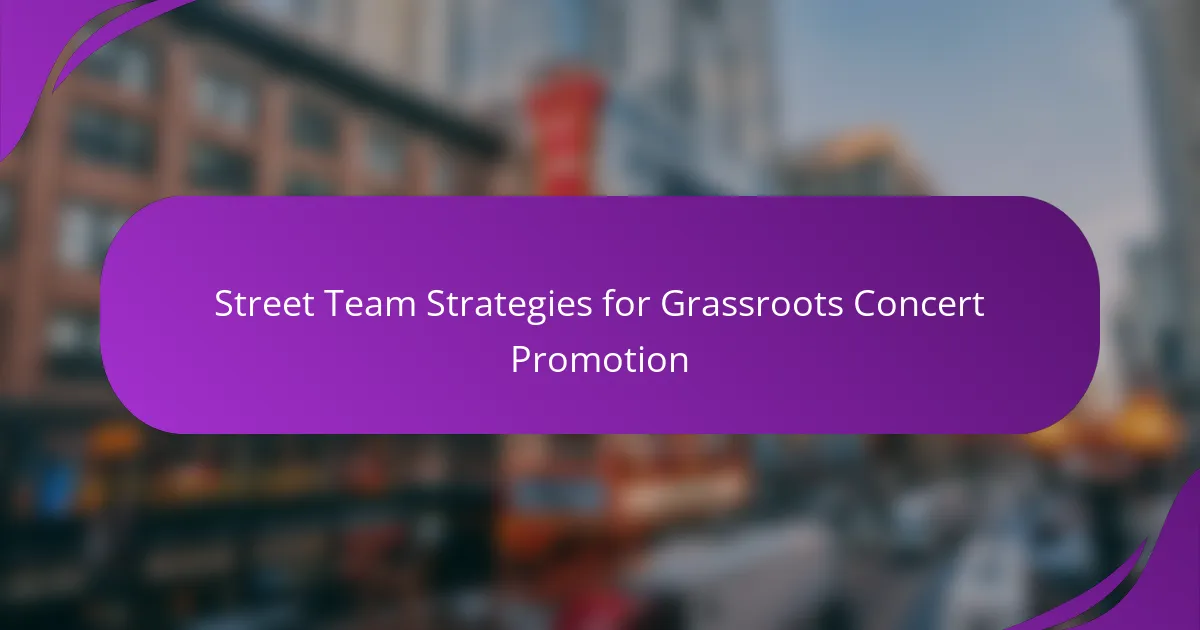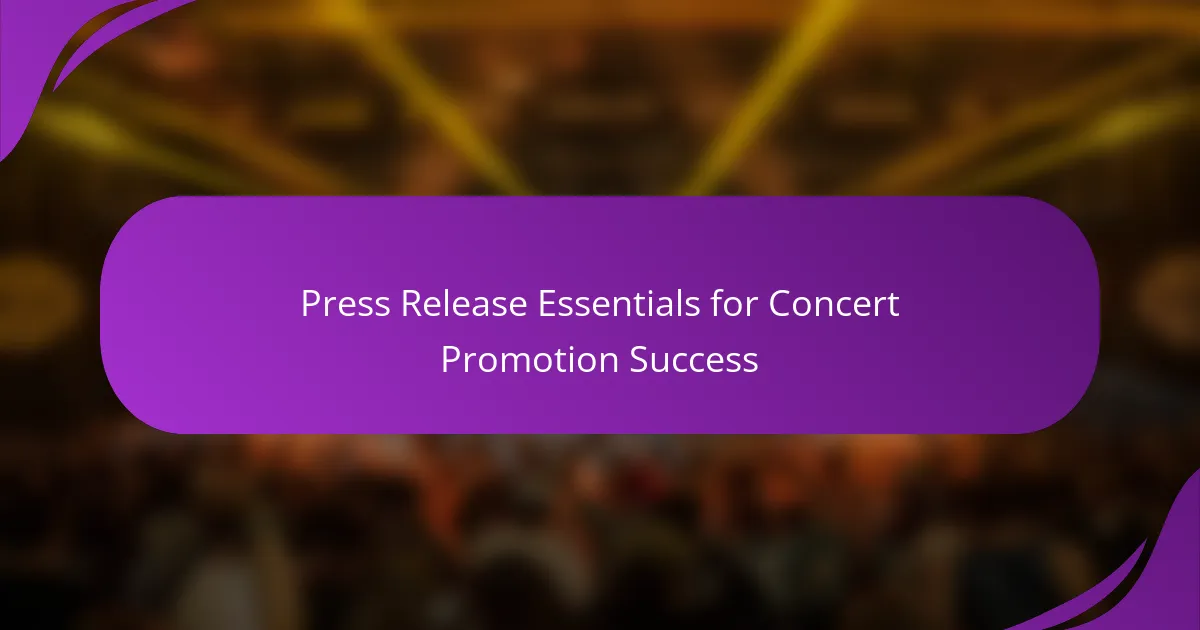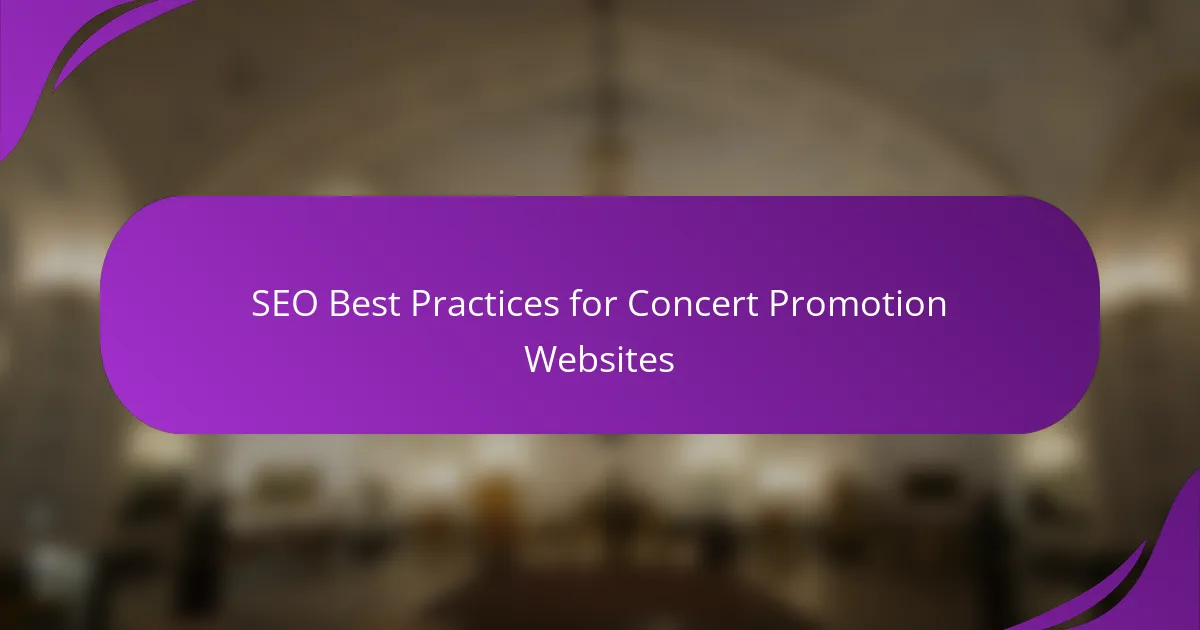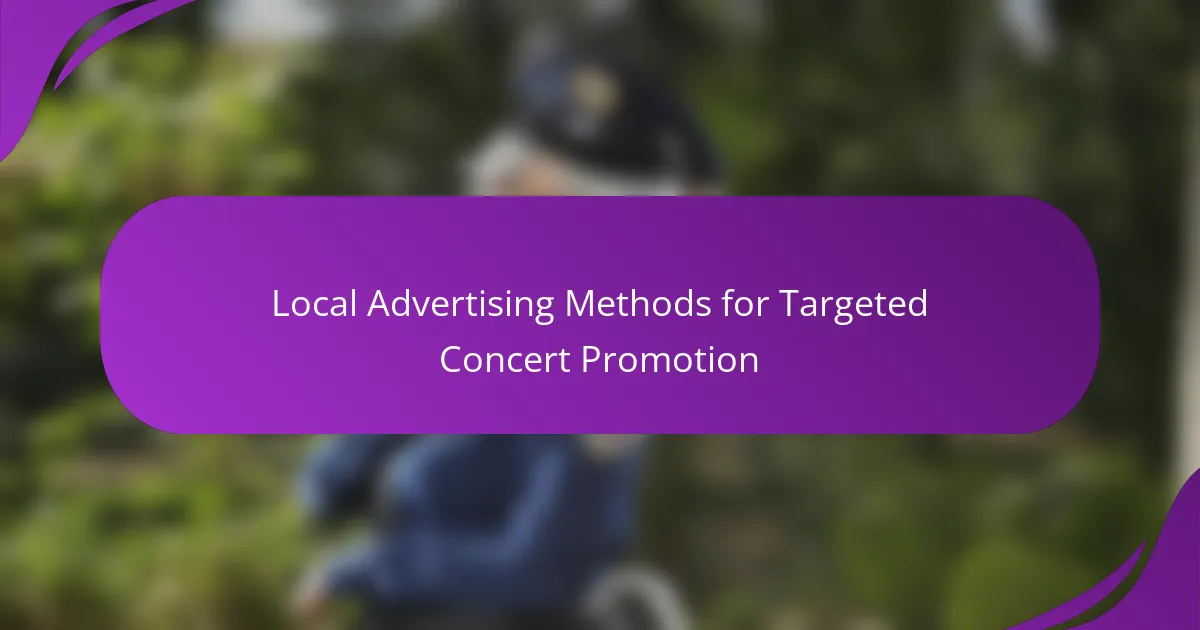Effective concert promotion on social media requires targeted strategies that engage audiences and drive ticket sales. Key components include identifying the target demographic, creating engaging content, utilizing multiple platforms, and leveraging analytics. Promoters should focus on high-quality visuals, collaborate with influencers, and employ paid advertising to reach specific user segments. Engagement with the audience through interactive posts and user-generated content is crucial, while analytics provide insights for refining future strategies based on performance metrics. This comprehensive approach enhances visibility and fosters community excitement around concerts.
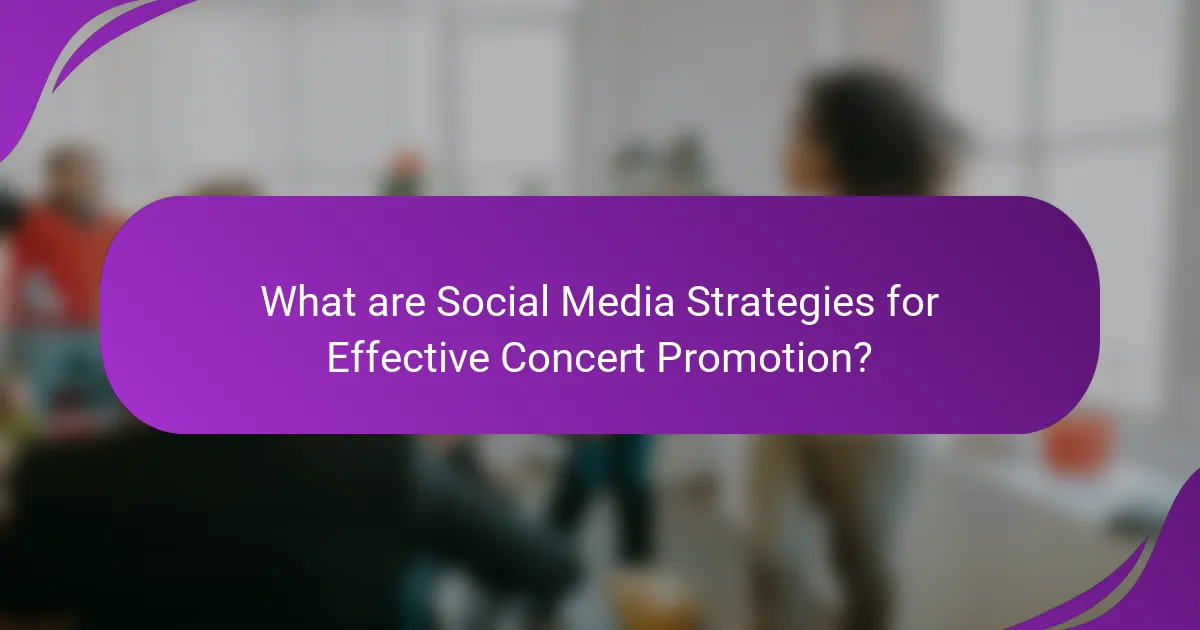
What are Social Media Strategies for Effective Concert Promotion?
Effective concert promotion on social media involves targeted strategies that engage audiences and drive ticket sales. First, identify the target demographic for the concert. Use analytics tools to gather data on audience preferences and behaviors. Next, create engaging content that resonates with this demographic. High-quality visuals, videos, and artist interviews can attract attention.
Utilize multiple platforms, such as Instagram, Facebook, and Twitter, to maximize reach. Each platform has unique features that can be leveraged, like Instagram Stories for behind-the-scenes content. Collaborate with influencers or local artists to expand visibility. Influencer partnerships can significantly increase audience engagement.
Additionally, employ paid advertising to target specific user segments. Facebook Ads can be particularly effective due to its robust targeting options. Create event pages to provide essential details and facilitate ticket purchasing. Regularly update followers with countdowns and reminders as the concert date approaches.
Engagement is crucial; respond to comments and messages promptly to build community. User-generated content can also enhance promotion. Encourage fans to share their excitement using a specific hashtag. This strategy fosters a sense of involvement and can amplify reach.
Finally, analyze the effectiveness of these strategies post-event. Metrics such as ticket sales, engagement rates, and follower growth provide insights for future promotions. These strategies collectively enhance visibility and drive successful concert attendance.
How can social media enhance concert promotion efforts?
Social media can significantly enhance concert promotion efforts by increasing visibility and engagement. Platforms like Facebook, Instagram, and Twitter allow artists and promoters to reach a wider audience. They enable targeted advertising to specific demographics, increasing the likelihood of ticket sales. Social media also facilitates direct interaction between artists and fans, fostering a sense of community. Engaging content, such as behind-the-scenes videos and live streams, can generate excitement and anticipation for events. According to a 2020 survey by Eventbrite, 60% of event-goers discover events through social media. This statistic underscores the importance of leveraging these platforms for effective promotion.
What platforms are most effective for promoting concerts?
Social media platforms like Facebook, Instagram, and Twitter are most effective for promoting concerts. Facebook allows event creation and targeted advertising, reaching specific audiences. Instagram’s visual content engages users through stories and posts, showcasing artists and events. Twitter facilitates real-time updates and interactions, enhancing audience engagement. TikTok has gained popularity for viral marketing, especially among younger demographics. According to a 2021 study, 74% of concertgoers discover events through social media. This statistic underscores the importance of these platforms in concert promotion.
How does audience engagement influence concert promotion success?
Audience engagement significantly influences concert promotion success. Engaged audiences are more likely to share event information. This sharing increases visibility and reach for the concert. Studies show that social media interactions can boost ticket sales by up to 30%. Engaged fans often create user-generated content, enhancing promotional efforts. Positive interactions lead to stronger brand loyalty and repeat attendance. Events with high engagement levels tend to sell out faster. Engaging content, such as behind-the-scenes footage, fosters deeper connections. Ultimately, audience engagement drives word-of-mouth marketing, crucial for concert success.
Why is a targeted audience important in concert promotion?
A targeted audience is crucial in concert promotion because it ensures marketing efforts reach the right people. Identifying a specific demographic helps in tailoring promotional content. This approach increases engagement and ticket sales. For instance, research shows that targeted ads can improve conversion rates by up to 50%. By focusing on fans of the genre or artist, promoters can maximize their return on investment. Additionally, understanding audience preferences allows for better event planning. This can include venue selection, pricing strategies, and promotional channels. Ultimately, a targeted audience enhances the effectiveness of concert promotions.
How can demographic analysis improve promotional strategies?
Demographic analysis can significantly enhance promotional strategies by tailoring marketing efforts to specific audience segments. Understanding age, gender, location, and interests allows marketers to create targeted messages. For instance, a study by Pew Research Center shows that 69% of adults in the U.S. use social media. This insight helps identify platforms where target demographics are most active. Additionally, demographic data can inform the timing of promotions, ensuring they reach audiences when they are most engaged. By leveraging this information, concert promoters can increase ticket sales and engagement rates.
What role does audience segmentation play in social media strategies?
Audience segmentation is crucial in social media strategies. It enables marketers to tailor content to specific groups. This increases engagement and relevance. Targeted messages resonate better with distinct demographics. Studies show that personalized content can boost conversion rates by up to 202%. Understanding audience preferences leads to more effective campaigns. Segmentation also optimizes ad spend by focusing on high-potential segments. This results in higher return on investment for social media efforts.
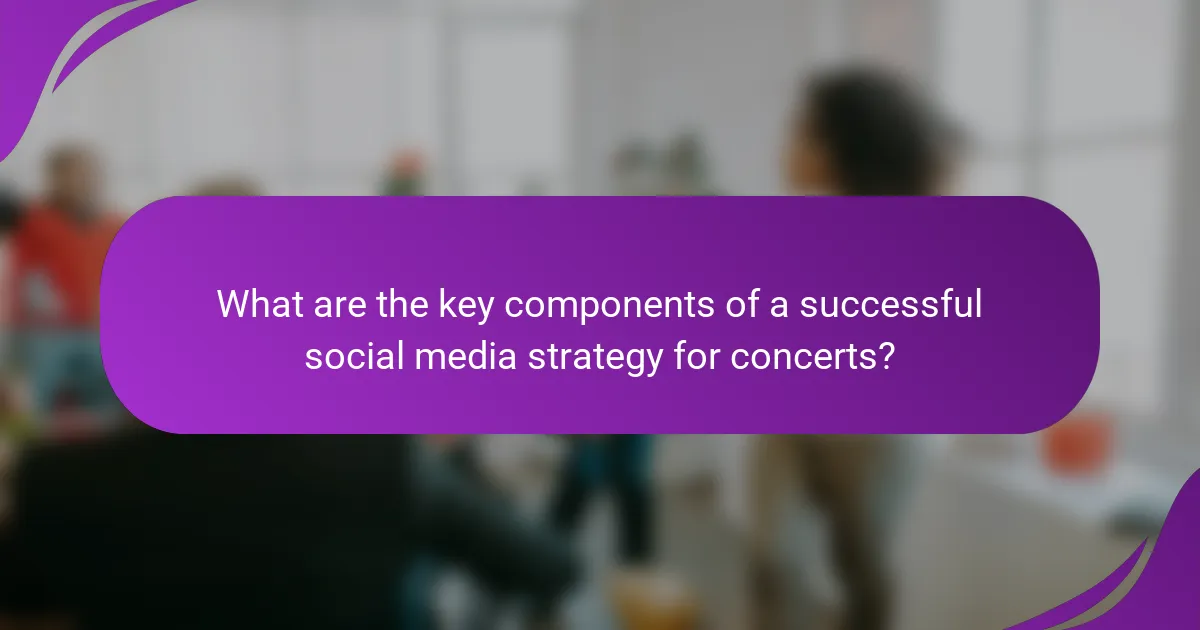
What are the key components of a successful social media strategy for concerts?
The key components of a successful social media strategy for concerts include audience engagement, content creation, targeted advertising, and analytics. Audience engagement fosters community and excitement around the concert. This can be achieved through interactive posts, polls, and responding to comments.
Content creation is essential for maintaining interest. High-quality images, videos, and behind-the-scenes content can attract attention. Targeted advertising helps reach specific demographics, increasing ticket sales. Social media platforms offer tools to target ads based on location, interests, and behaviors.
Analytics provide insights into what works and what doesn’t. By tracking engagement metrics, concert promoters can refine their strategies. Monitoring ticket sales and social media interactions helps gauge audience interest. These components work together to create a comprehensive social media strategy for concert promotion.
How can content creation impact concert promotion?
Content creation significantly impacts concert promotion by enhancing audience engagement and visibility. Quality content can attract potential attendees through compelling visuals and storytelling. Social media platforms amplify this reach, allowing promoters to connect with fans directly. Engaging posts can increase shares and interactions, leading to organic growth in audience interest. Statistics show that events with strong online content see higher ticket sales. For instance, a study found that concerts promoted with engaging video content can increase ticket sales by up to 30%. This demonstrates the direct correlation between effective content creation and successful concert promotion.
What types of content resonate most with concert-goers?
Concert-goers resonate most with behind-the-scenes content, artist interviews, and live performance clips. Behind-the-scenes content offers an exclusive look at the preparation and atmosphere of concerts. Artist interviews provide personal insights and stories that fans connect with. Live performance clips showcase the energy and excitement of the event, drawing in viewers. Additionally, user-generated content, such as fan photos and videos, enhances community engagement. Polls and interactive posts also attract concert-goers by inviting them to participate in discussions. Research shows that visual content, particularly videos, generates higher engagement rates on social media platforms.
How can visuals enhance engagement in concert promotion?
Visuals enhance engagement in concert promotion by capturing attention and conveying emotions. Engaging images and videos can stimulate interest in potential attendees. Research shows that posts with visuals receive 94% more views than those without. High-quality visuals can showcase the atmosphere and energy of a concert, making it more appealing. Additionally, visuals can communicate key information, such as dates and locations, effectively. Platforms like Instagram prioritize visual content, increasing visibility and interaction. Overall, effective use of visuals can significantly boost audience engagement and ticket sales.
What are effective advertising techniques on social media?
Effective advertising techniques on social media include targeted ads, engaging content, and influencer partnerships. Targeted ads allow brands to reach specific demographics based on user data. Engaging content, such as videos and interactive posts, increases user interaction and shares. Influencer partnerships leverage the audience of popular figures to promote events. According to a 2021 report by HubSpot, 70% of marketers found influencer marketing effective for brand awareness. Consistent posting schedules also keep audiences engaged and informed. Utilizing analytics tools helps measure the effectiveness of campaigns and adjust strategies accordingly.
How can paid promotions increase concert visibility?
Paid promotions can significantly increase concert visibility by targeting specific audiences. These promotions allow for enhanced reach on platforms like Facebook and Instagram. They utilize algorithms that show ads to users based on interests and behaviors. This targeted approach ensures the concert is seen by potential attendees.
According to a study by Statista, paid social media advertising can increase event attendance by up to 30%. Additionally, boosted posts can generate higher engagement rates compared to organic posts. This engagement leads to more shares and word-of-mouth promotion.
Overall, paid promotions effectively amplify concert visibility by reaching a wider, interested audience.
What are the benefits of using targeted ads for concert promotion?
Targeted ads for concert promotion increase audience engagement and ticket sales. They allow promoters to reach specific demographics that are most likely to attend. By analyzing user data, advertisers can tailor messages to resonate with potential concert-goers. This precision leads to higher conversion rates compared to traditional advertising methods. For instance, a study by Facebook showed that targeted ads can increase event responses by up to 30%. Additionally, targeted ads optimize marketing budgets by focusing on users with a genuine interest in the genre or artist. This results in more effective use of resources and maximizes return on investment. Overall, targeted ads enhance the effectiveness of concert promotion strategies.
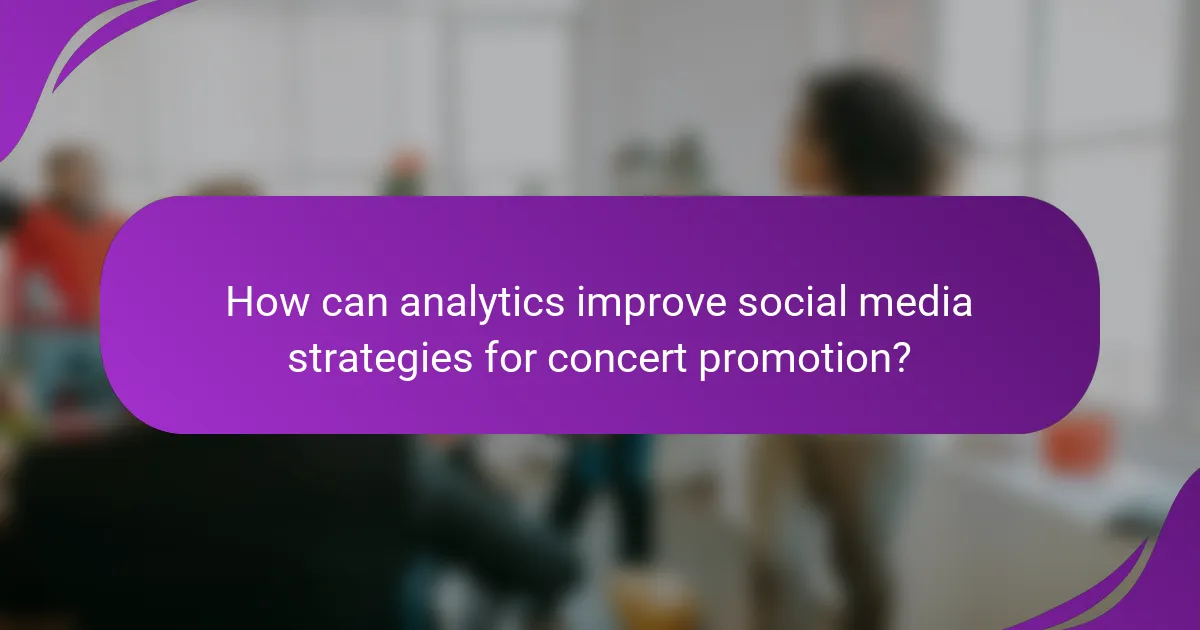
How can analytics improve social media strategies for concert promotion?
Analytics can significantly enhance social media strategies for concert promotion by providing data-driven insights. These insights help identify target audience preferences and behaviors. For instance, analytics can reveal which posts generate the most engagement. This allows promoters to tailor content that resonates with their audience. Additionally, analytics can track the effectiveness of different advertising campaigns. By measuring metrics such as click-through rates and conversions, promoters can optimize their ad spend. A study by Hootsuite found that brands using social media analytics experience a 30% increase in audience engagement. Thus, leveraging analytics leads to more effective and efficient concert promotion strategies.
What metrics should be tracked for concert promotion success?
Key metrics for concert promotion success include ticket sales, social media engagement, and audience reach. Ticket sales indicate the financial success of the event. Social media engagement measures how effectively promotional content resonates with the audience. Audience reach reflects the total number of potential attendees exposed to the promotion. Additionally, conversion rates track how many people take action after seeing promotional materials. Monitoring these metrics allows promoters to adjust strategies in real-time. According to Eventbrite, 80% of event organizers find social media to be the most effective channel for promotion.
How can engagement rates inform future promotional efforts?
Engagement rates can inform future promotional efforts by providing insights into audience preferences. High engagement indicates content resonates well with the audience. This data allows marketers to refine strategies based on what drives interaction. For instance, if video content generates higher engagement, future promotions can prioritize that format. Analytics show that posts with over 2% engagement typically lead to increased ticket sales. By analyzing engagement patterns, marketers can tailor messaging and timing for maximum impact. This targeted approach improves overall promotional effectiveness.
What tools can help analyze social media performance for concerts?
Tools that can help analyze social media performance for concerts include Hootsuite, Sprout Social, and Google Analytics. Hootsuite allows users to track engagement metrics and audience growth. Sprout Social provides detailed reports on post performance and audience demographics. Google Analytics tracks website traffic from social media sources, offering insights into user behavior. Other tools like Buffer and Socialbakers also provide analytics for social media campaigns. These tools help concert promoters understand audience interactions and optimize their strategies.
What are best practices for engaging with concert attendees on social media?
Best practices for engaging with concert attendees on social media include timely updates, interactive content, and personalized responses. Timely updates keep attendees informed about event details. Posting reminders about showtimes and ticket availability fosters excitement. Interactive content, such as polls or Q&A sessions, encourages attendee participation. Personalized responses to comments and messages build community and trust. Sharing user-generated content, like attendee photos, enhances engagement. Using event-specific hashtags increases visibility and connection among attendees. Monitoring social media analytics helps refine strategies based on audience preferences. These practices enhance the overall concert experience and foster a loyal fan base.
How can real-time updates enhance audience experience?
Real-time updates enhance audience experience by providing immediate information and engagement. They keep the audience informed about concert details, such as schedule changes or artist announcements. This immediacy fosters a sense of connection and involvement. For example, a study by the Pew Research Center found that 64% of social media users engage with live events through real-time updates. Such updates can also encourage audience interaction, leading to increased participation. Enhanced engagement through real-time content can lead to higher overall satisfaction at events.
What strategies can be used to encourage user-generated content?
Encouraging user-generated content can be achieved through several effective strategies. First, brands should create engaging campaigns that invite audience participation. This could involve contests or challenges that motivate users to contribute content. Second, providing clear guidelines for submissions helps users understand expectations. Third, showcasing user content on official platforms fosters a sense of community. Research indicates that 79% of consumers say user-generated content highly impacts their purchasing decisions. Additionally, incentivizing contributions with rewards or recognition can significantly boost participation. Lastly, leveraging social media platforms that facilitate sharing increases visibility and engagement.
What practical tips can enhance social media strategies for concert promotion?
Engaging content is crucial for enhancing social media strategies for concert promotion. Utilize high-quality images and videos from previous concerts to capture audience interest. Create countdown posts leading up to the event to build anticipation. Collaborate with local influencers to expand reach and attract diverse audiences. Use targeted ads to reach specific demographics interested in the genre. Encourage user-generated content by creating hashtags for fans to share their experiences. Regularly interact with followers by responding to comments and messages promptly. Analyze engagement metrics to refine strategies and understand what resonates with your audience. These practical tips can significantly improve visibility and ticket sales for concerts.
How can collaboration with influencers boost concert visibility?
Collaboration with influencers can significantly boost concert visibility. Influencers have established audiences that trust their recommendations. By promoting a concert, influencers can reach potential attendees who may not be aware of the event. This strategy leverages the influencer’s credibility to create buzz and excitement around the concert. Additionally, posts by influencers can generate user engagement, leading to increased shares and visibility across social media platforms. Studies show that influencer marketing can yield a return on investment of up to 11 times. This demonstrates the effectiveness of using influencers to enhance concert promotion.
What role do giveaways and contests play in promoting concerts?
Giveaways and contests play a significant role in promoting concerts. They generate excitement and engagement among potential attendees. By offering free tickets or exclusive merchandise, organizers attract a larger audience. Contests often encourage sharing on social media, increasing visibility. This social sharing can lead to organic reach and word-of-mouth promotion. According to a study by Eventbrite, 60% of concertgoers are influenced by social media giveaways. Overall, these strategies create buzz and drive ticket sales effectively.
The main entity of the article is ‘Social Media Strategies for Effective Concert Promotion.’ This article provides a detailed overview of strategies that enhance concert promotion through social media, emphasizing the importance of identifying target demographics, creating engaging content, and utilizing multiple platforms like Facebook and Instagram. It discusses the role of audience engagement, targeted advertising, and analytics in driving ticket sales and event visibility. Key components include content creation, influencer collaborations, and the measurement of promotional effectiveness through metrics such as engagement rates and ticket sales.
